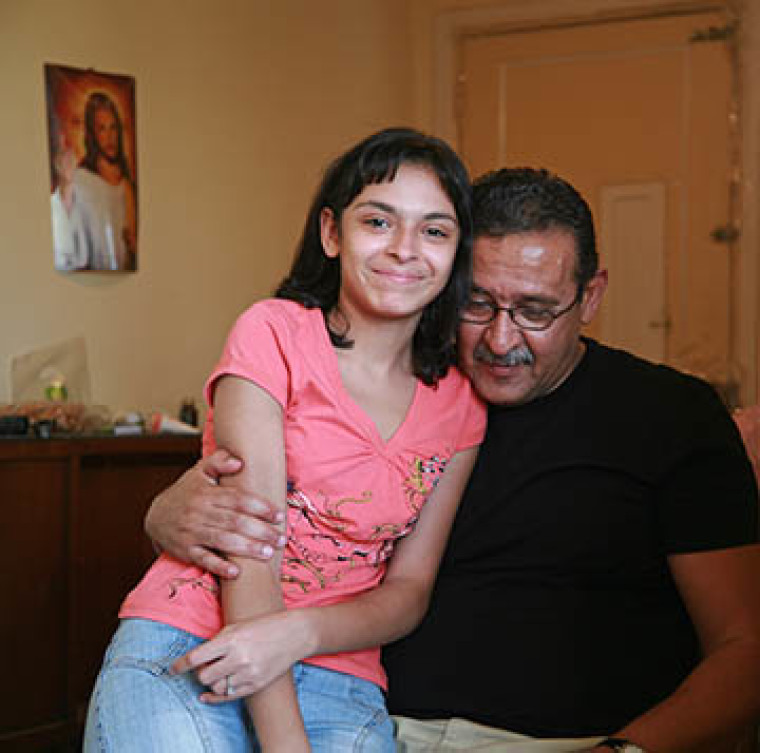
Maher Ahmad El-Mo'otahssem Bellah El-Gohary, 58, had become the target of Islamic ill will in Egypt after he tried to change the religious affiliation on his national identification card from Muslim to Christian. He and his daughter, 17-year-old Dina Mo'otahssem, arrived in Paris from Syria on March 30 after having fled to Damascus on Feb. 22 in the wake of the revolution in Egypt that deposed then-President Hosni Mubarak.
The Jan. 25-Feb. 11 protests in Egypt also weakened the Ministry of the Interior, an agency that had harassed El-Gohary and prevented him from leaving the country.
El-Gohary had fled to Syria because it was both the fastest and the easiest way to get out of Egypt, but he said he also feared Islamic opposition to converts in Syria and growing political unrest in Damascus.
"When we got to the French embassy in Syria, we were so scared because of what was happening in Syria at the time," he said.
It took him more than a month to secure a visa to leave Syria. Previously in Egypt, he had been able to leave because he had received a court decision ordering the Ministry of the Interior to allow him to leave the country; taking advantage of the confusion gripping Egyptian government agencies in the wake of the anti-Mubarak protests, he left with his daughter.
Eventually El-Gohary and his daughter hope to gain a visa to the United States and then immigrate.
Despite their newfound safety, El-Gohary and Dina are still shaken by their ordeal. They said they are afraid that a Muslim extremist in France could seek them out and attack them. They also have unresolved medical issues from the physical stress of two years of hiding and from not being able to receive proper medical care during that time.
On Monday (April 18), El-Gohary went to the Embassy of the United States in Paris to apply for U.S. asylum as well. According to a Coptic activist who requested anonymity, the embassy advised El-Gohary that his best option was for his wife, who lives in the United States, to apply for a visa to allow him to enter the country. El-Gohary is also applying for a tourist visa to the United States. Human rights activists have advised El-Gohary to stay in France while he applies for asylum rather than go to the United States on a tourist visa, which may leave him financially exposed and hinder his immigration efforts.
Meantime, El-Gohary's application for asylum in France qualifies him for an automatic three-month extension on his visa to France, which was set to expire at the end of the month. The extension can be renewed as long as his case is unresolved. It also qualifies him for certain government benefits.
'Miracle from God'
El-Gohary and his daughter were forced into hiding in August 2008 immediately after he filed his lawsuit to change his ID card's religious designation. The suit caused uproar in a country where, according to a recent Pew Research Center poll, 84 percent of Muslims in Egypt believe those who leave Islam should be executed.
El-Gohary filed the suit, he said, because he wanted to spare his daughter the persecution he suffered when he became a Christian in his 20s. In theory, the religion listed on his ID card would be used to determine the religion listed on Dina's.
In Egypt, it is illegal for adults not to have a national ID card, and it is nearly impossible to survive without one. It is necessary for opening a bank account, renting an apartment and obtaining medical care. Also, being identified as a Muslim in Egypt makes one subject to Islamic civil law, which would have prevented Dina from marrying someone identified as a Christian.
Freedom of religion, including the right to change one's religion, is guaranteed in Egypt by law. But in practice, while it is easy for Christian converts to Islam to change the religion listed on their ID cards, it is impossible for a Muslim convert to Christianity to do the same.
For the time that El-Gohary and his daughter were on the run, they lived a marginal existence, moving from one safe house to another about once every month. On different occasions, he and Dina were attacked. On one occasion, El-Gohary said, Dina had acid thrown on her. On another, he said someone came at him with a knife.
El-Gohary called his escape from Egypt a "miracle from God," but when he arrived in Syria he was quickly faced with the reality that he was alone in a country in which he had no support network and felt almost as unsafe as he did in Egypt. Also, his expectation that he would be able to quickly obtain a visa to the United States proved false. Frustrated by what he described as a cold reception at the U.S. Embassy in Damascus, he began to look for any country in Europe that would give him an entry visa.
On advice of the Vatican Embassy in Syria, El-Gohary went to the French Embassy in Damascus, which issued a short-term visa the same day.
"I really appreciate what the French ambassador did for us," El-Gohary said. "The French saved us."
El-Gohary was able to get to France with the support of Egyptian Christians and advocacy groups, most notably the United Copts of Great Britain. Dr. Ibrahim Habib, a Copt and the chairman of the group, said his organization arranged accommodation for El-Gohary and Dina with an Egyptian Christian in France. Habib said El-Gohary, motivated by fear, left for France unprepared.
"He was going to France without knowing anybody at all," Habib said. "He was just going to land in the airport and start thinking, 'What are we going to do?'"
For more information, visit www.compassdirect.org